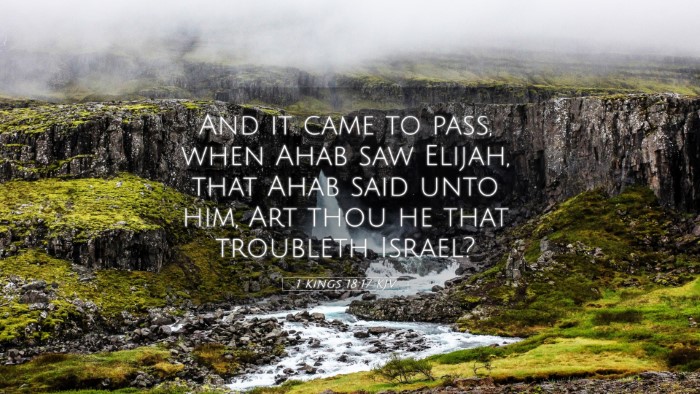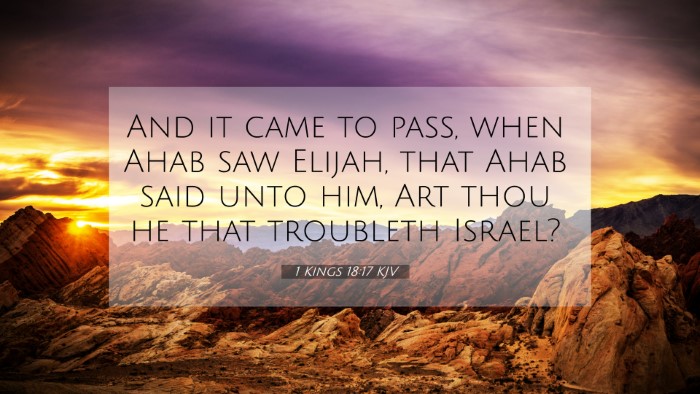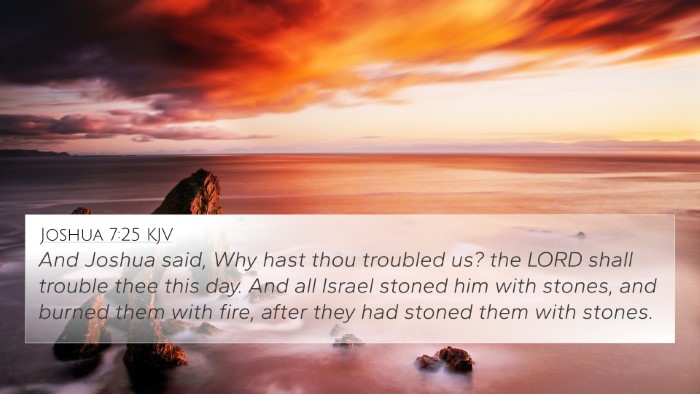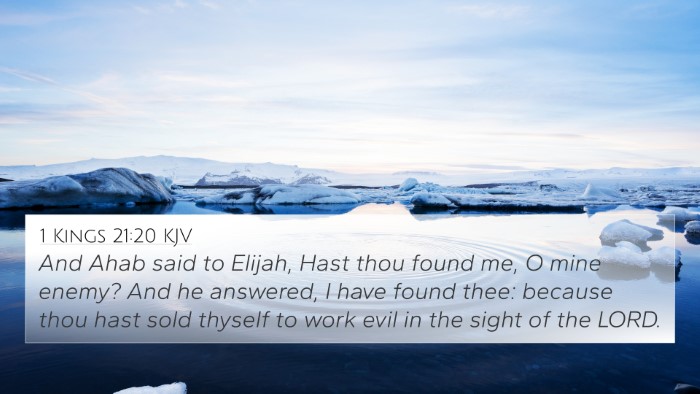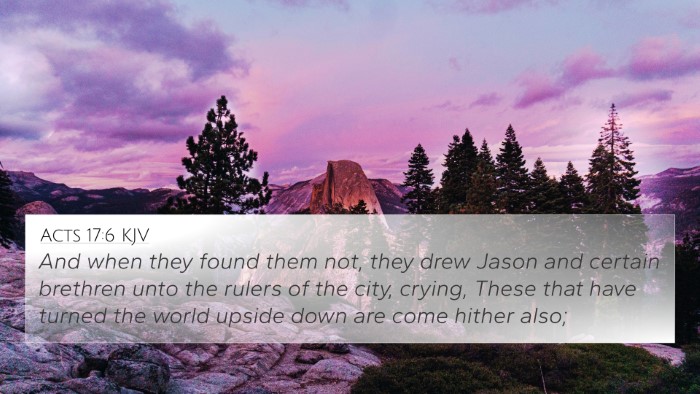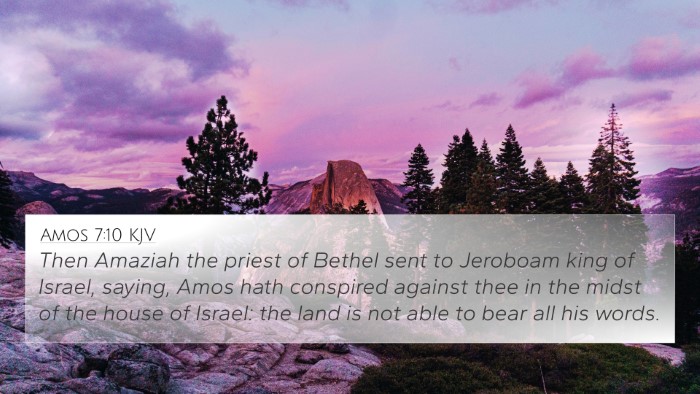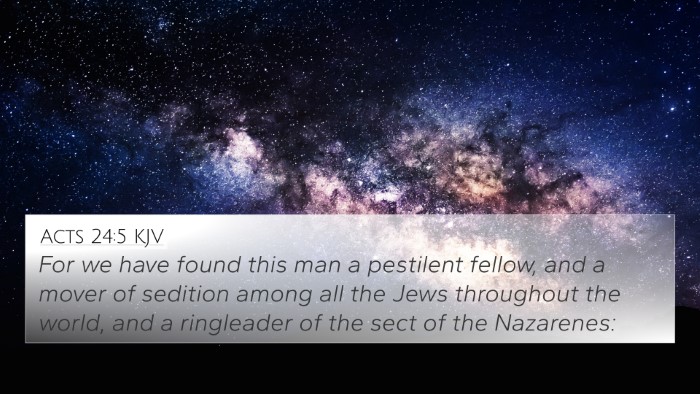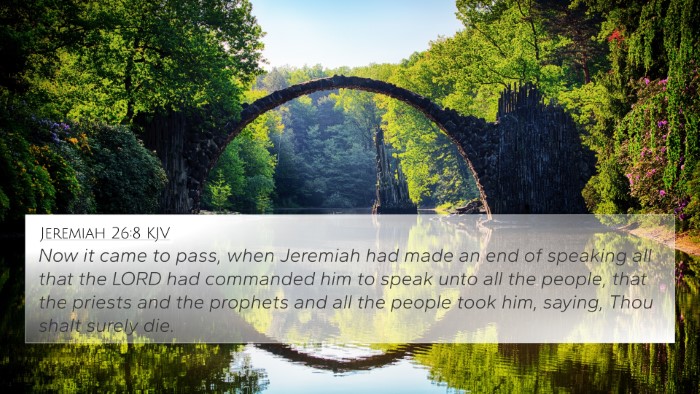Understanding 1 Kings 18:17
1 Kings 18:17 states:
"And it came to pass, when Ahab saw Elijah, that Ahab said unto him, Art thou he that troubleth Israel?"
Summary of Meaning
This verse marks a pivotal moment in the narrative of Elijah's confrontation with King Ahab, representing the classic struggle between the people of Israel, who had turned to idol worship, and the prophet of God who stood for divine truth. Ahab’s accusation of Elijah as the "troubler" of Israel encapsulates a common theme within Scripture: the conflict between prophetic voices and the ruling authorities.
Insights from Public Domain Commentaries
Matthew Henry's Commentary
Matthew Henry emphasizes Elijah's role as a true prophet amidst widespread apostasy. He notes that Ahab's charge against Elijah reveals the blindness of those who reject God's message; they often misinterpret zealous righteousness as a source of trouble. Henry suggests that Elijah, in fact, was the one working towards the restoration of Israel, not its destruction.
Albert Barnes' Notes
Albert Barnes observes the historical and political context, pointing out that Elijah had become a symbol of opposition against Ahab's policies which aligned with Baal worship. Barnes discusses how Ahab's statement reflects a broader misunderstanding of divine authority and the consequences of idolatry, as he inaccurately identifies Elijah's call for repentance as the real source of Israel’s troubles.
Adam Clarke's Commentary
Adam Clarke delves into the symbolic meaning of Ahab's encounter with Elijah. He highlights the irony of Ahab blaming Elijah for Israel’s suffering at a time when his own decisions led the nation away from God's covenant. Clarke suggests that this encounter sets the stage for dramatic confrontation, embodying the tension between earthly kings and the heavenly mandate given to prophets.
Thematic Connections in Scripture
This verse can be seen as part of a larger narrative throughout Scripture that deals with the themes of:
- Idolatry vs. Faithfulness: The confrontation illustrates the tension between worshipping the true God and following false gods.
- The Role of Prophecy: Elijah's confrontation serves as a reminder of the prophetic voice in calling people to accountability.
- Human Authority vs. Divine Will: Ahab's perspective on Elijah highlights the conflict between earthly power and spiritual truth.
Cross References
Several Bible verses interconnect with 1 Kings 18:17, helping to deepen our understanding:
- James 5:17: Refers to Elijah’s prayer life and his passion for God’s people.
- 1 Kings 16:30-33: Sets up the evil reign of Ahab that leads to the call for Elijah.
- Exodus 20:3-5: God’s command against idolatry is the foundation for Elijah’s confrontation.
- Luke 4:25-26: Jesus references Elijah to demonstrate Israel’s rejection of prophetic voices.
- Matthew 11:14: Indicates that Elijah’s spirit is present in the ministry of John the Baptist.
- Malachi 4:5: Promises the return of Elijah as a precursor to the Day of the Lord.
- Romans 11:4: Paul discusses the remnant of faithful believers, echoing Elijah’s experience.
Comparative Analysis of Relevant Verses
This reflective engagement with 1 Kings 18:17 through cross-referencing assists in revealing the interconnected nature of Scripture:
- Connecting Old and New Testaments: The echo of Elijah's voice can be found in Jesus’s ministry, particularly in his challenge to the Pharisees.
- Theme of Faithfulness: Both Elijah and the New Testament prophets faced severe opposition in their calls for repentance.
- Worship Dynamics: As seen throughout Kings, every King’s allegiance to God or Baal affected the nation’s fate, a theme explored further in the Gospels.
Tools for Bible Cross-Referencing
To better understand the depth of cross-referencing within the Bible, consider these tools:
- Bible Concordance: Useful for locating specific verses and their themes.
- Bible Cross-Reference Guide: Helps track linked verses across different biblical contexts.
- Cross-reference Bible Study: Techniques for studying the Bible in light of interconnected verses.
Conclusion
In examining 1 Kings 18:17 through the lens of various commentaries and the context of Scripture, one finds a rich tapestry of faith, authority, and the call to repentance. The connections to other verses enrich our understanding and enhance our ability to engage with the text both individually and within community study.
Further Study Suggestions
For those looking to delve deeper into this passage and its implications, here are a few study suggestions:
- Explore the Role of Major Prophets: Investigate how the ministry of Elijah compares to other prophets within the Old Testament.
- New Testament Parallels: Examine the connections between the actions of Elijah and those of Jesus or John the Baptist.
- Thematic Studies: Conduct thematic studies on idolatry and fidelity to God throughout biblical history.

